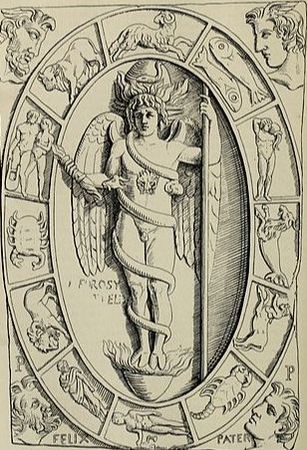THE GOD PHANES IN GREEK MYTHOLOGY
The Greek God Phanes
Phanes is a Greek god who appears in the Orphic tradition of Greek mythology, and as such is a Greek god who is rarely commented upon.
Today, the most famous Greek deities are those listed in Hesiod’s version of the genealogy of the gods (the Theogony), and in this work there is no mention of Phanes. In the Orphic tradition though, Phanes was a Protogenoi, a primordial god.
Today, the most famous Greek deities are those listed in Hesiod’s version of the genealogy of the gods (the Theogony), and in this work there is no mention of Phanes. In the Orphic tradition though, Phanes was a Protogenoi, a primordial god.
phanes in the Orphic Tradition
|
The Orphic tradition is confusing in its time line, and genealogy of the gods, especially when compared to the more linear tradition of Hesiod, but it essence it was suggested that Aion, Time or Eternity personified, brought into existence the world egg.
From this egg emerged Phanes, either with, or without the intervention of Chronos (Time, who might or might not have been Aion), and Ananke (Inevitability). Phanes’ name means “light bringer”, but in the Orphic tradition Phanes was the Greek god of Creation and Life, from whom all subsequent life developed. If comparing the Hesiod and Orphic traditions, then Phanes might be equated with the Protogenoi Eros. |
Phanes King of the Cosmos
|
It is perhaps incorrect to called Phanes a god, for he was considered to be both male and female, beautiful in appearance, with golden wings, intertwined with a serpent’s tail.
Phanes would become the first king of the cosmos, and would have one daughter, Nyx, the Greek goddess of Night. Nyx would succeed Phanes as the supreme goddess, before the title was passed onto Phanes’ grandson, Ouranos, then onto Cronus and finally onto Zeus. |
|
Phanes in Greek Mythology Tales
In surviving texts Phanes is rarely mentioned, for most surviving works are based upon the Hesiod tradition, but in late Greek mythology, circa 5th century AD, Nonnus merges the two traditions in his version of the birth of Dionysus.
Hera would have killed Dionysus the new-born son of Zeus, but for the intervention of Hermes who stole Dionysus away. Hermes though could not hide from Hera, and so the trickster god transformed himself into looking like Phanes. Hera spotted “Phanes”, but his prestige was such that she did not investigate further, and so Hermes, and Dionysus, went undiscovered.
Hera would have killed Dionysus the new-born son of Zeus, but for the intervention of Hermes who stole Dionysus away. Hermes though could not hide from Hera, and so the trickster god transformed himself into looking like Phanes. Hera spotted “Phanes”, but his prestige was such that she did not investigate further, and so Hermes, and Dionysus, went undiscovered.
|
|
